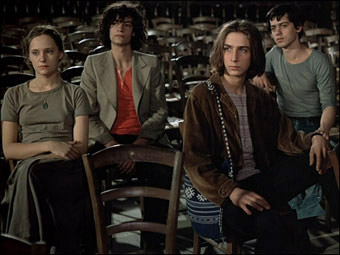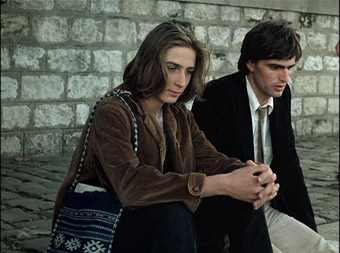|
The Devil, Probably (1977) was Robert Bresson's penultimate feature and the first Bresson film that I saw. This may seem to be coming at a director's oeuvre in reverse, but it was the first of his films I was old enough to see on its cinema release, and access to his back catalogue in pre-home video days was very much a matter of luck and location. I'd been steered towards this particular work by my film lecturer of the time, a man I both liked and whose views I respected, and at this young age I knew of Bresson only by reputation and this was to be my belated introduction to his cinema.
I hated it. In retrospect at least, this is not that surprising. At this young age I was still at the world cinema sampling stage and had yet to realise that much of what I assumed was fresh and original in Hollywood movies was anything but (mind you, this was the late 70s, probably the last time Hollywood WAS fresh and original). But in other ways I should have connected with the film's young protagonist far more than I did. We were both students, we were both disillusioned by similar things and we were both suffering a sense of alienation from those around us. I just couldn't understand why this guy was so miserable about it, and indeed why everyone in the damned film seemed so miserable about just about everything.

With the passing of time, the broadening of taste and the experience and appreciation of a far wider range of cinema, I felt better equipped to approach the film a second time, and yet this viewing proved, if less frustrating than the first, then still a bumpy ride. A third helped to smooth out some of these bumps and to clarify my relationship to a film some regard as a masterpiece, but which I still have decidedly mixed feelings about.
It opens with the news that a young student, Charles, has committed suicide, a headline that is then called into question by a second one suggesting he may have been murdered. The film then hops back to explore the six months leading up to the incident, centring on Charles and his relationship to his closest friends, the two women he was involved with, and society at large.
Technically, The Devil, Probably is a model of minimalist economy, with characters and relationships not so much introduced as identified on the move, with brief, carefully composed shots and sequences standing in for scenes that would in other hands occupy considerably more screen time. There's a stillness and sense of isolation to some of these sequences that is particularly effective. This is most tellingly realised when Charles sends his drug-addicted friend Valentin to buy a gun and the soundtrack falls almost silent, the few figures that do walk the streets having an almost ghostly quality, shapes that Charles observes but has become increasingly unable to connect to.
I remain, however, uncertain about my relationship (or lack thereof) with this central character, one of a group of young intellectuals who have become disillusioned with religion, greed, politics and society in general. But this is 1977 not 1968, and his increasing disengagement even from those close to him inspires in Charles not positive (re-) action but disconnection, blank depression and a move towards death as his only logical way forward. In this, Bresson touches on a real and still very relevant issue of teenage suicide and the life pressures that lead to it. What he doesn't do is explore in any real depth the mindset that leads a young person to contemplate such action. Despite his monotone conversations with friends and a psychiatrist, one who rather irresponsibly suggests to him a way to end his life if he lacks the strength to do it himself, Charles is a dourly inexpressive blank page whose true state of mind remained as unclear to me as it does to his cheerless friends.

Maybe that's the point. The film's stylistic connection to the Nouvelle Vague has been noted before, but it also has an expressionistic quality in the way the world is painted very much as Charles appears to see it, as one devoid of purpose and positive qualities in which the planet is being sacrificed in the pursuit of money, where debate leads only to division, and protest action is reduced to misguided calls to revolution and trivial pranks. But aside from the extended footage of environmental destruction (itself now familiar and oft-used imagery), the minimalist approach can't help but reduce complex arguments to a few clichéd buzz phrases. An underground revolutionary calls for the destruction of the present system and Charles wonders aloud what he would put in its place – it's a valid question, but by not exploring the debate beyond the standard "anything would be better" response, the argument is rendered simplistic and becomes an insubstantial call to apathy. Later, Charles tells his psychiatrist that his problem is that he sees things too clearly, but little in his actions or this superficial evidence-gathering suggests this to be true.
That I share Charles' cynicism but not his self-indulgent fatalism is my good fortune, and having twice had to deal with real-world consequences and complexities of suicide, I can perhaps be forgiven for not sharing his (and by association Bresson's) almost romantic view of it as an inevitable statement of societal abandonment. By choosing to take his own life, by whatever means, Charles does not reject the world in which he lives, but freely participates in that world's rejection of him. For me the real sadness of his death is that if left me with no real sense of loss.
I'm not sure what the official aspect ratio of the film is but for one shot on 35mm in the mid 1970s it seems unlikely that it was projected at 1:33:1, but that's what we have here, though I have to say that at no point did it feel cramped at the sides or opened up at the top and bottom. In other respects, the transfer scores well, displaying pleasing sharpness and contrast. Some detail is lost in darker scenes but this looks to be deliberate rather than a transfer issue.
The Dolby 2.0 mono track is clear and free of pops and hiss and that's all that's required for a film with no music track and often minimal use of sound effects. Silence is sometimes as crucial here as dialogue it's important that it be unblemished by unwanted noise.
Only the same Bresson filmography found on the Artificial Eye discs of A Man Escaped and Lancelot du Lac.
I'm sure there are hardcore Bresson fans out there groaning at my inability to appreciate one of his masterworks, but such is the eye of the beholder. For many The Devil, Probably is a powerful portrait of youth in despair, but as someone who shared Charles' experiences and disenchantment at a similar time in European history, I found myself unable to connect with him back then and remain similarly afflicted thirty years on. Bresson is clearly leaving us to supply much of the back detail that he provides only a small window to here, but my own experiences of the torturous road that leads to suicide makes it difficult for me to sympathise with someone who chooses to walk that route simply because the world is not turning out how he'd hoped.
Artificial Eye's DVD looks good and despite my suspicions about the aspect ratio I didn't spot any real framing issues so this may well be correct. The lack of extra features is, once again, a shame.
|